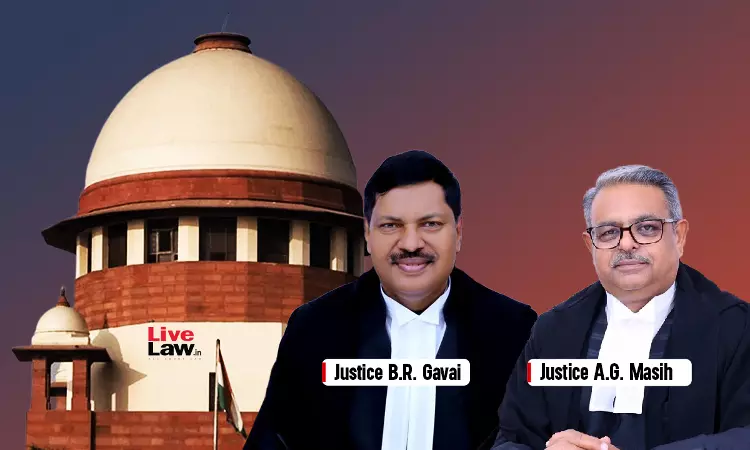- Home
- /
- Supreme court
- /
- Arbitral Award Must Be Within...
Arbitral Award Must Be Within Parameters Of Agreement Between Parties : Supreme Court Dismisses Chinese Company's Appeal
Yash Mittal
29 Sept 2025 11:32 AM IST
The Supreme Court has recently upheld the setting aside of an arbitral award of nearly ₹995 crore granted in favour of Chinese company SEPCO Electric Power Construction Corporation, holding that the arbitral tribunal had erred by re-interpreting contractual terms and departing from the agreed stipulations in violation of Section 28(3) of the Arbitration and Conciliation Act,...
The Supreme Court has recently upheld the setting aside of an arbitral award of nearly ₹995 crore granted in favour of Chinese company SEPCO Electric Power Construction Corporation, holding that the arbitral tribunal had erred by re-interpreting contractual terms and departing from the agreed stipulations in violation of Section 28(3) of the Arbitration and Conciliation Act, 1996.
“Numerous precedents laid down by this Court have often emphasised that an arbitrator lacks the power to deviate from or to reinterpret the terms of the contract while making an award. The awards must be within the parameters of the agreement entered between the parties.”, the Court said.
A bench of Chief Justice of India BR Gavai and Justice AG Masih heard the case where the contractual terms do not allow waiver of notice for raising claims unless the parties have agreed to it in written form. After SEPCO left the construction site in 2015, arbitration followed, and in 2020, the tribunal awarded SEPCO ₹995 crore, holding that GMR Kamalanga Energy Ltd had waived notice requirements via a 2012 email. The Orissa High Court's Division Bench set aside the award, prompting SEPCO's appeal to the Supreme Court.
Affirming the Orissa High Court's Division Bench decision, the judgment authored by Justice Masih observed that the EPC agreement contained a clear "No Oral Modification" clause, stating that any waiver or variation required a written agreement signed by both parties.
The Court found that the arbitral tribunal overstepped its mandate by using a 2012 email to create a case of "waiver" or "equitable estoppel" that was never pleaded by SEPCO. This act, the Court held, amounted to the tribunal rewriting the core terms of the contract for the parties, a direct violation of Section 28(3) of the Arbitration Act, which mandates that tribunals decide disputes in accordance with the contract's terms.
“Both the Arbitral Tribunal as well as the Single Judge of the High Court were mistaken to grant relief to SEPCO, upholding the assumed waiver of the mandate of notice despite explicit provisions of the Amended CWEETC Agreement to the otherwise effect.”, the court observed.
“A perusal therefore crystalises that it is the interpretation of an arbitral award which determines whether a contract or a specific provision thereof is considered part of the award or not. If a clear reliance is placed by the arbitrator on the contract, a presumption arises in favour of the incorporation, while a vague or general reference opposes such a presumption…The 1996 Act, through the mandate of Section 28 Sub-Section 3, casts an explicit duty on a tribunal to resolve disputes in accordance with the terms of the contract and accepted business practices.”, the Court added.
The Court held that this was a classic case justifying the High Court's Division Bench interference under Section 37 of the Arbitration Act, despite its narrower scope compared to Section 34. It upheld the Division Bench's decision to overturn the Single Judge's findings, noting that the latter had committed a patent error by overlooking the contractual terms on “waiver”. The contract did not permit a unilateral waiver of notice for claims; such a waiver was valid only if agreed to in writing by both parties. Hence, the Tribunal and the Single Judge erred in treating the respondent's email as a waiver of notice not saved by Section 28(3) of the Act.
“Therefore, it appears that even if the arbitrator's legal or factual reasoning is faulty, the courts ought to ideally refrain from interfering with an award until an error of law is evident from the award itself or in a document that forms an integral component thereof.”, the court said.
“The scope under Section 37, as rightly argued by SEPCO, is slimmer than that under Section 34, but, in the instant case, the Section 34 Judgment had failed to appreciate the gross violations of the basic principles of adjudication of a dispute. While one may argue some of those may be latent and not a prima facie violation, thereby not mandating any interference, direct omission of the mandate of Section 18 and Section 28 Sub-Section 3 of the 1996 Act are clearly patent through a skimming of Arbitral Award.”, the court added.
Accordingly, the appeal was dismissed.
Cause Title: SEPCO ELECTRIC POWER CONSTRUCTION CORPORATION VERSUS GMR KAMALANGA ENERGY LTD.
Citation : 2025 LiveLaw (SC) 963
Click here to read/download the judgment
Appearance:
For Petitioner(s) : Mr. Neeraj Kishan Kaul, Sr. Adv. Mr. Jayant Mehta, Sr. Adv. Mr. Sumeet Kachwaha, Adv. Mr. Samar Singh Kachwaha, Adv. Ms. Ankit Khushu, Adv. Ms. Garima Bajaj, AOR Ms. Bhavana Chandak, Adv. Mr. Aakshat Khetarpal, Adv. Mr. Vikramaditya Sanghi, Adv. Mr. Dhruv Sharma, Adv. Ms. Dhanya Krishnan, Adv. Mr. Udit Sidhra, Adv.
For Respondent(s) : Dr. A.M. Singhvi, Sr. Adv. Mr. Ashok Parija, Sr. Adv. Mr. Ciccu Mukhopadhaya, Sr. Adv. Mr. Mahesh Agarwal, Adv. Mr. Prashant Pakhidey, Adv. Mr. Manu Krishnan, Adv Ms. Aanchal Mullick, Adv. Mr. Manav Gill, Adv. Mr. Daksh Arora, Adv. Mr. Avishkar Singhvi, Adv. Ms. Swastika Parija, Adv. Mr. Nidhiram Sharma, Adv. Mr. E. C. Agrawala, AOR



